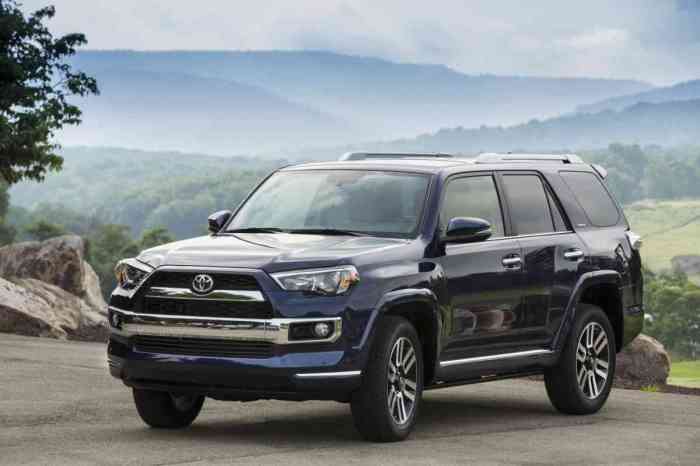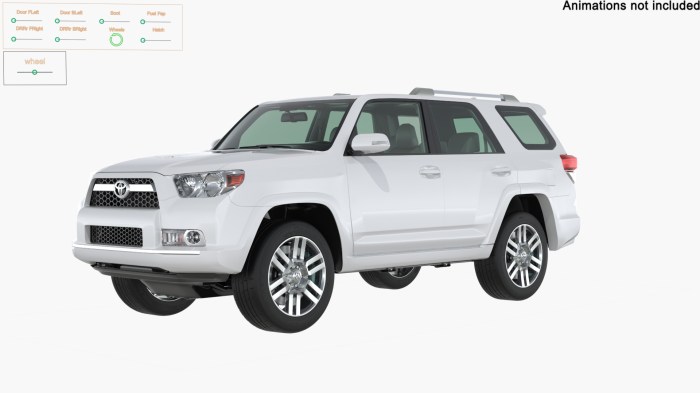How Toyota 4Runner Compares to Other Mid-Size SUVs – The Toyota 4Runner, a stalwart in the SUV market, has carved a niche for itself with its rugged design and off-road capabilities. But how does it fare against other mid-size SUVs that offer a blend of practicality, comfort, and adventure? This comprehensive comparison will delve into the key aspects, helping you determine if the 4Runner is the right fit for your needs, or if a competitor might be a better option.
We’ll examine factors like performance, fuel economy, interior space, technology features, safety ratings, and of course, pricing.
Performance and Off-Road Capabilities: King of the Trail?
The 4Runner’s reputation is built on its off-road prowess. Its body-on-frame construction, available four-wheel drive system (often with locking differentials), and high ground clearance provide a significant advantage over unibody competitors like the Honda Passport or Ford Bronco Sport. These competitors lean more towards on-road comfort and efficiency. However, the 4Runner’s powertrain, while reliable, might not match the power and acceleration of some rivals with turbocharged engines.
This is a trade-off: raw power versus off-road dominance. Consider your driving style and terrain; if serious off-roading is a priority, the 4Runner shines. If mostly paved roads are your domain, other options might offer a more refined driving experience. The Jeep Wrangler, a direct competitor in terms of off-road capability, often offers more advanced off-road features, but at the cost of on-road comfort and fuel economy.
Key Performance Differences:, How Toyota 4Runner Compares to Other Mid-Size SUVs
- Toyota 4Runner: Body-on-frame construction, excellent ground clearance, robust off-road capabilities, less refined on-road handling.
- Honda Passport: Unibody construction, more refined on-road handling, less off-road capability, better fuel economy.
- Jeep Wrangler: Body-on-frame, superior articulation and off-road tech, but compromises on-road comfort and fuel efficiency.
- Ford Bronco Sport: Unibody, balances on and off-road capabilities, but less extreme than the Wrangler or 4Runner.
Fuel Economy: A Trade-off for Capability
The 4Runner’s powerful engine and body-on-frame construction translate to less-than-stellar fuel economy compared to its unibody competitors. Expect lower MPG figures, particularly during city driving. This is a crucial consideration for daily commuters or those with long drives. Hybrid options are absent from the 4Runner lineup, unlike some competitors which offer fuel-sipping hybrid powertrains. The Honda Passport, for instance, often boasts significantly better fuel economy figures.
This difference in fuel consumption can add up considerably over time, influencing the overall cost of ownership.
Interior Space and Comfort: Family-Friendly or Not?
While the 4Runner offers ample cargo space, particularly with the rear seats folded, its interior might feel less refined than some of its competitors. The materials used might not feel as premium, and the technology integration might lag behind some newer models. However, the upright seating position provides good visibility, a benefit for off-road driving. Families should carefully consider the third-row seating option (if available) and its practicality, as it might be cramped for adults.
Competitors like the Subaru Ascent or Kia Telluride often offer more spacious and comfortable third-row seating arrangements.

Source: fourwheeltrends.com
Technology and Safety Features: Keeping Up with the Times
The 4Runner’s infotainment system has seen updates, but it might still feel somewhat dated compared to the latest offerings from other manufacturers. Some competitors boast larger touchscreens, more intuitive interfaces, and advanced features like wireless Apple CarPlay and Android Auto. Safety features are a growing concern, and while the 4Runner offers a range of standard safety technologies, some competitors might offer more advanced driver-assistance systems (ADAS) such as adaptive cruise control, lane-keeping assist, and automatic emergency braking, often as standard features or optional upgrades.
Pricing and Value: Balancing Capability and Cost
The Toyota 4Runner’s price point generally reflects its rugged capabilities and off-road focus. While it might not be the cheapest mid-size SUV on the market, its resale value tends to be strong, which can offset some of the initial cost. Comparing the 4Runner’s price to similarly equipped competitors is essential to determine the best value for your money.
Factors like trim level, optional packages, and regional pricing variations will impact the final cost. It’s crucial to research current market prices and compare various trim levels to understand the overall value proposition.
Frequently Asked Questions (FAQ)
- Q: Is the Toyota 4Runner good for off-roading? A: Yes, the 4Runner is renowned for its off-road capabilities thanks to its body-on-frame construction, high ground clearance, and available four-wheel-drive system with locking differentials.
- Q: How is the fuel economy of the 4Runner? A: The 4Runner’s fuel economy is generally lower than its unibody competitors due to its heavier construction and less aerodynamic design.
- Q: Does the 4Runner have a third-row seat? A: Some 4Runner trims offer a third-row seat, but it is generally considered cramped for adults.
- Q: How does the 4Runner’s technology compare to other mid-size SUVs? A: The 4Runner’s infotainment system might feel less advanced compared to some competitors, although it has been updated in recent years.
- Q: What are the 4Runner’s safety features? A: The 4Runner offers a range of standard safety features, but the availability of advanced driver-assistance systems (ADAS) may vary depending on the trim level.
Conclusion: Choosing the Right Mid-Size SUV
The Toyota 4Runner excels in off-road performance and reliability. However, compromises exist in fuel economy, interior refinement, and technology compared to some competitors. Ultimately, the best mid-size SUV for you depends on your individual priorities and driving needs. If off-road capability is paramount, the 4Runner is a strong contender. But if fuel efficiency, on-road comfort, and cutting-edge technology are more important, other options in the mid-size SUV segment might be a better fit.
Carefully consider your budget, driving style, and family needs before making a decision.
References:
- Toyota 4Runner Official Website
- Edmunds Toyota 4Runner Review
- Car and Driver Toyota 4Runner Review
- Kelley Blue Book Toyota 4Runner
Call to Action:: How Toyota 4Runner Compares To Other Mid-Size SUVs
Ready to find the perfect mid-size SUV for your adventures? Visit your local Toyota dealership for a test drive and explore the Toyota 4Runner and its competitors. Compare features, pricing, and specifications to make an informed decision. Don’t hesitate to ask questions and let the sales team guide you towards the best option for your lifestyle.
FAQ
What is the Toyota 4Runner’s biggest competitor?
The Jeep Wrangler is often considered the 4Runner’s main competitor, due to their shared focus on off-road capability.

Source: turbosquid.com
Is the Toyota 4Runner reliable?
The 4Runner has a strong reputation for reliability, often ranking highly in reliability surveys.
How does the 4Runner’s fuel economy compare to other mid-size SUVs?
The 4Runner generally has lower fuel economy than many of its competitors, due to its body-on-frame construction and powerful engine.
What are the 4Runner’s major safety features?
Standard safety features vary by model year but often include Toyota Safety Sense, which incorporates features like automatic emergency braking and lane departure warning.
